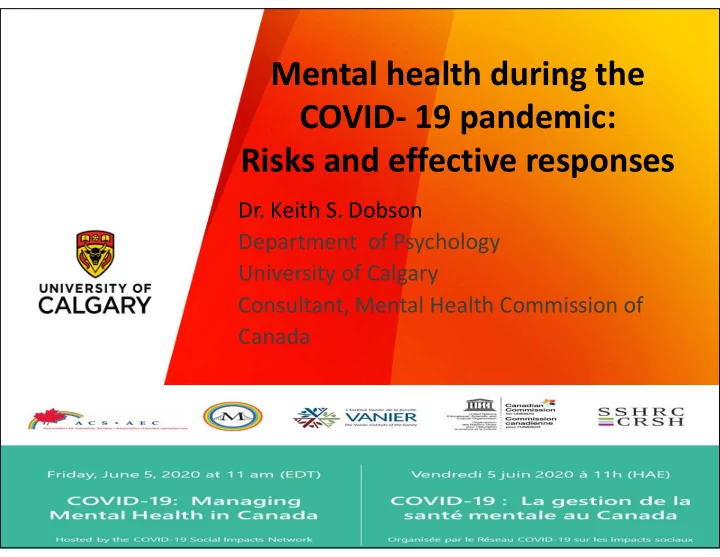

Mental health during the COVID‐ 19 pandemic: Risks and effective responses Dr. Keith S. Dobson Department of Psychology University of Calgary Consultant, Mental Health Commission of Canada
COVID‐ 19: Managing Mental Health in Canada Factors associated with increased stress and anxiety: Unpredictability Uncontrollability Personal Importance Stress 2
COVID‐ 19: Managing Mental Health in Canada Risk Factors for Mental Illness Models of risk and resilience evolve over time. Established factors exist in multiple domains: Biological Social Psychological
COVID‐ 19: Managing Mental Health in Canada Biological Risks Genetic risk Familial transmission Neural structures Neurobiology (neurotransmission) Sleep dysregulation ANS arousal Gender
COVID‐ 19: Managing Mental Health in Canada Psychological Risks Schemas, beliefs, assumptions Information processing biases Pessimism Negative explanatory style Rumination Avoidant problem-solving Avoidant/ escape behaviors
COVID‐ 19: Managing Mental Health in Canada Social Risks Parental psychopathology/ parenting style Adverse Childhood Experiences (ACEs) Attachment Negative life events (e.g. loss, unemployment) Couple and relationship issues Low levels of social support Stress generation Reassurance-seeking and negative feedback-seeking
COVID‐ 19: Managing Mental Health in Canada Protective factors for mental health 1. Balanced and recuperative temperament. 2. Physical well-being/ regular sleep. 3. Coping strategies. 4. Social and personal competence. 5. Positive peer relationships. 6. Positive family relationships.
COVID‐ 19: Managing Mental Health in Canada Conclusions about risk Mental Disorders represent a broad range of conditions Symptom presentation, stage of episode, and risk and resiliency factors for each case will vary One size, and one model, will not fit all cases of Mental Ilnness
COVID‐ 19: Managing Mental Health in Canada Treatments That Work– Comments No one treatment is “the best” Most validated treatments have about equal outcomes Combining treatments might improve outcomes, especially for more severe cases of mental health problems Validated treatments should be the first approach If one treatment does not work, another may Earlier treatment is associated with better outcome Focus on treating the current issue, but also preventing relapse Conduct risk assessments when indicated Go to https://www.nice.org.uk for guidelines
COVID‐ 19: Managing Mental Health in Canada What Can We do in Canada? Increased surveillance and assessment Use the MHCC continuum model Ask friends and family. Check in with GP or EAP service.
COVID‐ 19: Managing Mental Health in Canada What Can We do in Canada? Maintain routines as much as possible (eat, sleep, work) Exercise Get outside Watch your self‐ talk; note especially worry or rumination Turn down the media noise Schedule activities: — Set specific short and long‐term goals in the areas of productivity and enjoyment, every day.
COVID‐ 19: Managing Mental Health in Canada What Can We do in Canada? Keep social contact, even when physically distant Practice acceptance and gratitude Do something for others if at all possible If in doubt, check it out. — Public Health Agency of Canada — Health Canada — Provincial Ministries of Health — World Health Organization
COVID‐ 19: Managing Mental Health in Canada What Can We do in Canada? Lots of easy online resources, many free. Ensure health information and resources are from a reputable organization or provider. If necessary, get professional help. Thank you! Merci!
Recommend
More recommend